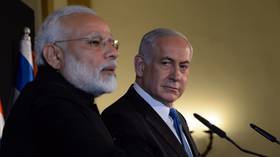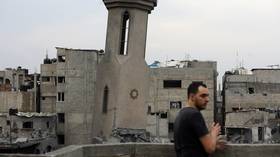India stands in solidarity with Israel – Modi

Indian Prime Minister Narendra Modi stated he was “deeply shocked by the news of terrorist attacks in Israel” hours after the Palestinian armed group Hamas launched a massive attack in southern Israel. The attacks mark one of the most significant escalations of the Palestine-Israeli of conflict in decades.
“Our thoughts and prayers are with the innocent victims and their families. We stand in solidarity with Israel at this difficult hour,” read the rest of the Indian prime minister’s post, which he shared on X (formerly Twitter).
On Sunday, Israel’s ambassador to India, Naor Gilon, told the media that his country was overwhelmed by support extended by the Indian government and ordinary citizens.
“The support started by Prime Minister Modi, who tweeted a very supportive tweet. But I was approached by ministers, by business people, by civil servants, and by ordinary Indians. Just people wrote to us, and you see the social media. We are really, really bombarded with love and support. [It is] amazing. It is not something we take for granted,” he said.
Foreign policy experts noted that India’s condemnation of “terrorist attacks” was in contrast to the tone adopted by some of its partners in the Global South, an informal grouping of developing countries in the southern hemisphere, and more in line with its G7 allies in the West, which have invariably condemned Palestine over the attacks.
“India’s stance is clearly out of step with countries in the Global South,” Rajesh Rajagopalan, Professor of International Politics at JNU, told ThePrint, “We have been harping on counter-terrorism in Quad, SCO, BRICS, and so many other forums so we couldn’t ignore the seriousness of these attacks. Second, our bilateral compulsions with Israel when it comes to technology transfer could have played a role. Also, Israel is a strategic partner for India in I2U2 and the proposed India-Middle East-Europe Economic Corridor.”
South Africa, seen as a major player in the Global South with whom New Delhi has boosted its engagement lately, blamed Israel for the latest flare-up in an official statement.
“The region is in desperate need of a credible peace process that delivers on the calls of a plethora of previous UN resolutions for a two-state solution and a just and comprehensive peace between Israel and Palestine,” the statement concluded.
Indonesia’s foreign ministry released a statement, saying it was “deeply concerned with the escalation of conflict between Palestine and Israel,” urging the immediate end of violence “to avoid further human casualties.” Taking to X, Malaysian Prime Minister Anwar Ibrahim said that “the confiscation of land and property belonging to the Palestinian people is done relentlessly. As a result of this injustice, hundreds of innocent lives were sacrificed.”
India’s key partners in the Middle East, including Saudi Arabia and the United Arab Emirates (UAE), with whom New Delhi has been increasing its economic cooperation lately, called a halt to the escalation.
“The Kingdom renews the call of the international community to assume its responsibilities and activate a credible peace process,” said Saudi Arabia’s Foreign Ministry in a statement, adding that it should lead to a “two-state solution to achieve security and peace in the region and protect civilians.”
The UAE called for both sides to exercise the utmost restraint and an immediate ceasefire to prevent dangerous implications, according to a statement by the Ministry of Foreign Affairs.
Hamas launched thousands of missiles at Israel and deployed its militants to infiltrate Jewish settlements near the border with Gaza on October 7. Hundreds of people have been killed and thousands wounded on both sides of the conflict since then. Israel says more than 700 people have been killed and 100 kidnapped, including citizens of European countries and the US. Following Israel’s retaliatory air strikes, over 400 people have been killed and some 2,200 wounded in Gaza, according to Palestinian officials.












